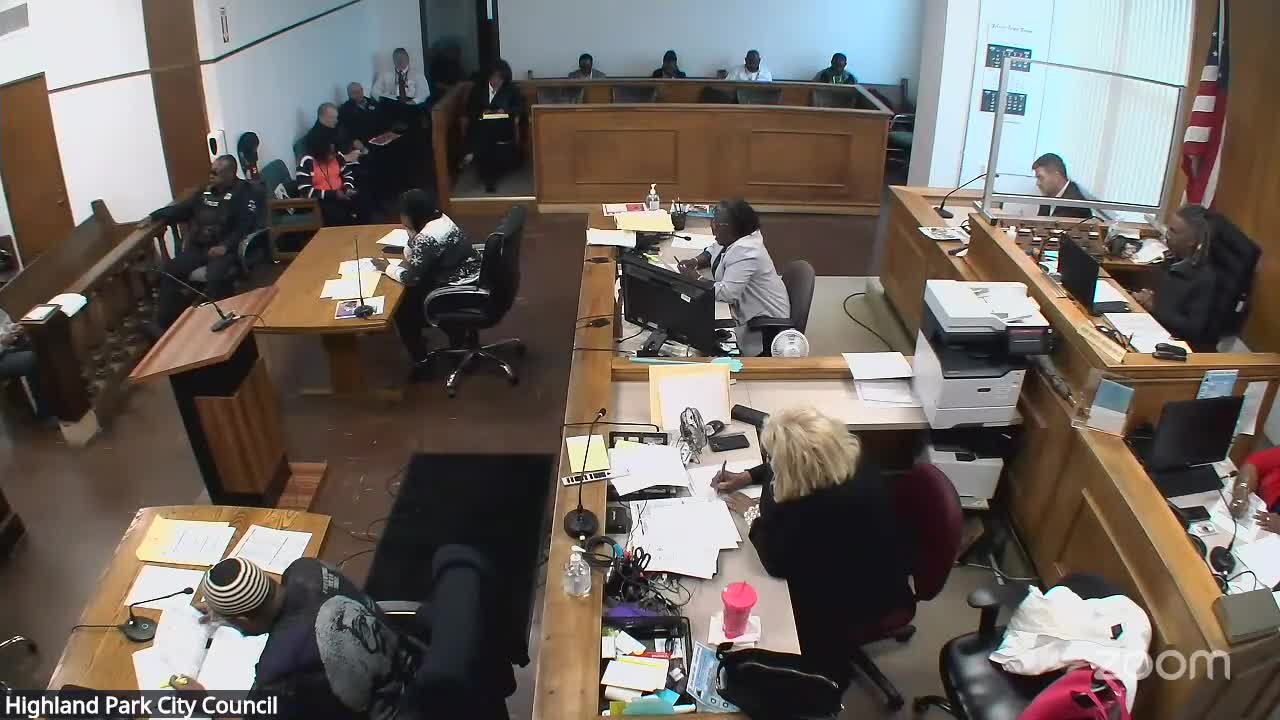Highland Park council hears hours of public comment and consultant analysis on proposed water, sewer and stormwater rates
Get AI-powered insights, summaries, and transcripts
Subscribe
Summary
City council opened a public hearing on the proposed water department budget and rates; an independent consultant recommended modest near‑term increases while projecting larger decreases after planned meter and infrastructure work. Residents pressed officials for clearer bills and relief.
Highland Park — The City Council opened a public hearing May 5 on the proposed Water Department budget and rates for fiscal years 2025–26, hearing extended public comment and a presentation from an independent rate consultant that urged short‑term increases to stabilize utility finances while forecasting larger reductions after planned metering and infrastructure work.
The hearing drew more than a dozen speakers and a detailed presentation from Mark Bocia, independent rate consultant with Utility Financial Solutions LLC. Bocia told the council the city’s financial projections assume inflation of roughly 3% per year, and that the near‑term plan would include a 5% water increase in 2026 and a series of smaller increases thereafter. "Next year, we're projecting that the water will decrease by 19% and sewer by 10%," Bocia said, adding that the decreases depend on improved metering and capital work.
The consultant and multiple public speakers emphasized two structural drivers of Highland Park's higher bills: an aging distribution system with water loss and the city’s combined sewer system, which routes stormwater into the wastewater treatment stream. Bocia said the city’s infrastructure is older than the U.S. average and recommended boosting cash reserves to protect against unexpected failures: "We want you above $3,000,000" in minimum cash reserves, he said, noting current reserves were far below that level.
The hearing focused on both wholesale charges the city pays and retail bills residents see. Residents repeatedly asked why Highland Park’s wholesale and retail sewage charges are substantially higher than nearby cities. Charlene Turner Johnson, a resident who spoke during the hearing, highlighted the effect of meter sizes on customer charges: "There are homes that have these 1 inch ... meters, and they are charged more than twice the rate for other residents that have 5/8‑inch meters," she said, urging the city to review the readiness‑to‑serve charges on 1‑inch residential meters.
Several residents, including Robert Lodge and Carla Oliver, repeated numbers from recent billing cycles and questioned apparent inconsistencies between fiscal‑year wholesale charges and the higher retail bills that residents receive. Lodge asked whether the wholesale supplier that serves Highland Park was the same entity with which the city had negotiated long‑term terms, and whether the city was considering a long contract; he asked if Highland Park faced a 30‑year contract with that supplier. Bocia and council members said the consultant’s work included modeling a five‑year rate path and sensitivity tests showing that delaying increases would require larger, later increases to catch up.
Council members clarified the hearing’s purpose as information gathering: no rate ordinance was adopted during the session. Councilwoman Manuka moved to open the hearing, the council approved by roll call, and later moved to close the hearing after public comment and the consultant presentation. The votes to open and close the hearing were taken by roll call and recorded in the minutes; the council did not adopt final rate changes at the May 5 meeting.
Why this matters: Highland Park residents told council members they are struggling with high utility bills while public officials said the city must show financial stability to secure state grants and fund a large capital program to replace mains and services. Bocia told the council the capital program budget contains multi‑million‑dollar years of work — and that state grant funding is expected to be a primary funding source for much of the replacement work.
Other details raised during the hearing included: - The consultant’s projection that the city could spend roughly $15–$19 million per year on water system construction in later planning years, with most of that funding expected from state grants; the consultant noted multi‑year assumptions are uncertain and require ongoing review. - A proposed mix of near‑term rate adjustments (a 5% water increase for 2026 and annual smaller increases; multi‑year wastewater adjustments cited in the presentation) intended to grow cash reserves and preserve debt coverage ratios. - Resident requests for staff to review the city’s meter sizing policy and the “readiness‑to‑serve” fixed charges on 1‑inch residential meters.
Council and administration next steps include distributing the consultant’s full report to council members for further review, scheduling follow‑up sessions to drill into budget line items, and continuing negotiations and technical work on meter installations and the capital plan. The public hearing record will remain in the city’s official minutes for use in subsequent rate decisions.
The record: Councilwoman Manuka moved to open the public hearing on the proposed water department budget and rates; roll call was recorded at the opening. The hearing closed later the same meeting after public comment and the consultant presentation; the council did not adopt final rate changes on May 5.
Ending: The city will not finalize rates until additional staff work, follow‑up council review and public notice are completed; residents and council members urged quicker clarity on how meter sizes and billing components translate to individual household bills.
